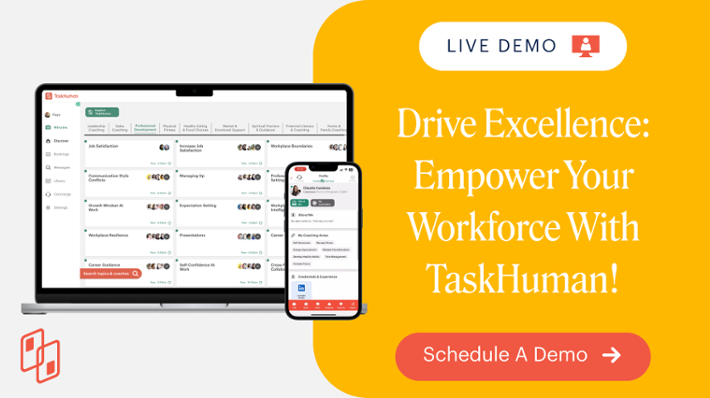
Organizations in multiple industries are quickly adopting AI-enabled tools to help their business needs, with some investing quite heavily. The global adoption rate of AI technology currently stands at 35%. Human Resource Professionals are using AI to automate repetitive tasks and streamline processes which can include recruiting, onboarding, and training. AI-synthesized data helps HR professionals make better and faster decisions about everything from hiring, and performance management to which development initiatives to pursue. HR teams are supporting employees at the moment they need it, giving them the customized knowledge they want through easy-to-reach chatbots and other forms of AI communication tools.
What does AI mean for Coaches?
Business coaches partner closely with HR departments as a key resource for employee and leadership development. Coaching yields some of the best return on investment (ROI) when it comes to upskilling workers and strengthening teams. A Metrix Global study found that executive coaching has a 788% return on investment (ROI) based on factors including increases in productivity and employee retention. Coaches are using AI to provide a better experience for employees and free up time to take on more clients needing their specific expertise.
- Coaching Session Notes – AI-powered writing assistants can turn coaching conversations into recap notes and insights which they can easily share after a coaching session. It can be difficult for employees to write down or type all the information they want to remember during a coaching session. AI-generated notes especially help people engaged in coaching sessions on the go– in their car or a creatively private place at home.
- Improved Client/Coach Match – Coaches and employees can match better with the help of AI tools that use data and learning algorithms to create detailed client and coach profiles. Employees can select a coach with the precise expertise they need and personality traits that complement their learning style.
- Narrowed Focus – Because they’re easier to find, more coaches can niche down, only coaching employees who have needs in which they specialize. A higher level of coaching experience can result.
What AI Can’t Do
With all its capabilities, AI still has its limitations. The widespread use of AI across an organization, and particularly in the HR department, elevates the coaching field as a much-needed human touch and oversight. The coaching process offers opportunities to balance out AI technologies that thrive on data across large sections of the population. One of the biggest fears concerning AI technology is its failure to build meaningful connections and deliver accurate feedback to the humans using it.
- Data Integrity – Humans leverage AI technology to get the data to synthesize. And people, as well as machines make mistakes. AI outputs must constantly mirror the goals of an organization. Coaches can act as human observers who catch AI-created disparities between organizations’ goals and AI-assisted outputs.
- Human Connections – People desire interaction with one another (all be it, to varying degrees). A trusting relationship with a coach fills a personal as well as professional need for many employees. With AI touching more of workers’ professional lives, the chance to check in with an experienced human being regarding performance challenges and ambitions can breathe life into their career experience.
AI can’t tell a memorable story to make a point while softening the delivery. AI can’t empathize with a human heart, sharing in someone’s grief or excitement. Coaches can coax feedback from an individual and intuitively guide them to self-realizations that drive internal change. Coaches offer this level of emotional and cognitive support unmatched by AI.
- Emotional Intelligence – AI might have the information a person is looking for, but it can’t intuitively package that information in a motivating tone with impacting imagery. Coaches understand how to deliver information for maximum uptake and can initiate a back-and-forth dialogue that encourages employees to generate problem-solving insights from within.
- Hidden Biases – AI uses the data it’s fed to generate insights and learn. It can’t distinguish between good and bad data, so any bias that exists in the original data will perpetuate in the various derivatives AI can generate. Unconscious bias can stem from any part of the data that is ungoverned, mismanaged, or low-quality.
AI is also increasingly used to help HR professionals automate training and advancement processes. If the technology is unintentionally trained on hidden biases in the data, workers belonging to protected groups may be less likely to participate in development opportunities or be promoted. Coaches bring awareness to leaders about the ways they can include protected groups and safeguard them from potential technology biases.
Human Resources Professionals and their employee coaching partners will increasingly rely on AI to enhance their talent development capabilities. AI can help coaches provide comprehensive support to employees, and minimize unintended outcomes AI can produce if used exclusively. Coaches are known to provide accountability that sparks progress in employees they work with. And, they’ll also provide a layer of accountability for the use of AI in talent development applications.
More about AI implementation in the workplace: AI Is Changing The Role Of HR

